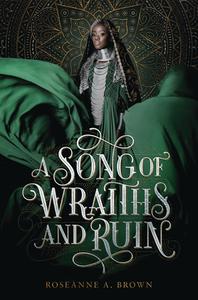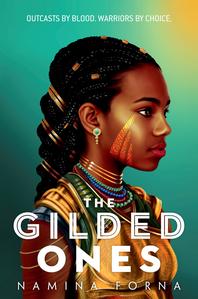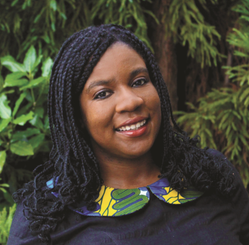|
|||
|
|||
Rosanne A. Brown is an immigrant from the West African nation of Ghana and a graduate of the University of Maryland, where she completed the Jimenez-Porter Writers' House program. Her debut YA fantasy, A Song of Wraiths and Ruin ($18.99, Balzer + Bray), about a princess and a refugee faced with a deadly situation, is now available.
Namina Forna has an MFA in film and TV production from USC School of Cinematic Arts and a BA from Spelman College. The Gilded Ones, her debut novel, will be published by Delacorte in 2021.
Here, Forna and Brown discuss feminism, spirituality and writing about contemporary Black girls.
Namina Forna: I loved A Song of Wraiths and Ruin! There were so many twists and turns! I went in expecting a romance and got so much more. The world-building, the depth of the characters and the arcs they go through. How did you come up with that idea?
Roseanne A. Brown: Thank you so much! I got the idea for ASOWAR when I was a junior in college. I was walking back from a therapy appointment thinking to myself, "Wow, if a ghost possessed me right now, they'd probably just give me my mind back because there is a lot going on in there." From there, I was absolutely taken with this idea of a character who dealt with supernatural possession and how that would interact with mental illness, and wanted to know what kind of world would create a person like this. Thus, A Song of Wraiths and Ruin was born. What inspired The Gilded Ones?
Forna: The kernel for The Gilded Ones came when I was a freshman in undergrad. I started having dreams of a girl in golden armor kicking ass on the battlefield, and I thought, "Hmmm, I wonder what she's about." At the time, I was grappling with questions about what it meant to be a woman, feminist issues and I knew I wanted to talk about it. Then I went to grad school, and I was sitting in a lecture hall when these words fell into my head: "I was nine years old when first I learned I could not die." From that came The Gilded Ones.

Forna: For TGO, I really wanted to look at the tools of patriarchy. What are the structures that are in place to support patriarchy and to ensure that everyone falls in line? And what happens when you start questioning them? Religion plays such a huge role in social conditioning, which is why it was one of the big things I examined, and my main character starts off religious but over time, starts to question everything she's been taught.
Brown: Exactly. How do you go against something that has shaped your entire life but that is also extremely oppressive? How do you work within an institution that has brought you personal salvation but that you see implemented to harm others?
 Forna: Right?! The interesting thing is, the questions I ask in TGO are the same ones I asked in undergrad. It was my young adult self asking these questions of how I wanted to move in the world. Is that the same with ASOWAR?
Forna: Right?! The interesting thing is, the questions I ask in TGO are the same ones I asked in undergrad. It was my young adult self asking these questions of how I wanted to move in the world. Is that the same with ASOWAR?
Brown: Yes! That's what I love about writing YA, you are reaching readers just as they're asking these really big questions about themselves and the world around them. Many are stepping outside of their childhood bubble for the first time and challenging a lot of the institutions they were raised to believe in without question.
Forna: Yeah, like with ASOWAR, religion basically defines the world the characters live in, but when your protagonist's mother dies, there's that whole arc where she goes against the religion to try to resurrect her mom. She's on her own against these forces outside her control.
Brown: Karina is certainly up against a lot! I think that's something so many Black girls can relate to because far too often, Black girls don't have people to save them in fantasy or in the real world. So I really wanted to write a character who is powerful and full of agency, but she also deserves to be saved and cared for by others.
Forna: And for me, I actually wanted to fight against that when I wrote TGO. Because even though Deka is physically strong, she's emotionally vulnerable--not weak, but vulnerable. So that's why I gave her the love interest she has, because he holds her up when she needs support. And I think this is the difference and the allowance that an African-based fantasy allows. Outside the white gaze, Black girls can be damsels in distress, too--in as much as a super-powered girl can be a damsel in distress.
Brown: But that's the thing, there's space for those stories. People say fantasy's dead, everything's dead. But no, we're just starting to get there.
Forna: Especially African-based fantasy. People are like, there are so many of those. But there are so many cultures and worlds to explore.
Brown: There's definitely this perception that there are way more of us than there really are, when the truth is it's because we are so hyper visible, we stick out, especially in a landscape as homogenous as YA SFF has historically been. And people start to assume all the Black-centered fantasies must be the same when the truth is that they are all so different from one another because there are so many nuances.
Forna: Sometimes, I think we're like mermaids--even rarer than unicorns. You actually have to search the bottom of the ocean to find us, but when you do, we sort of stick out. I think things are changing, the industry is opening up. There'll be more worlds to explore, and I, for one, can't wait to see it.



